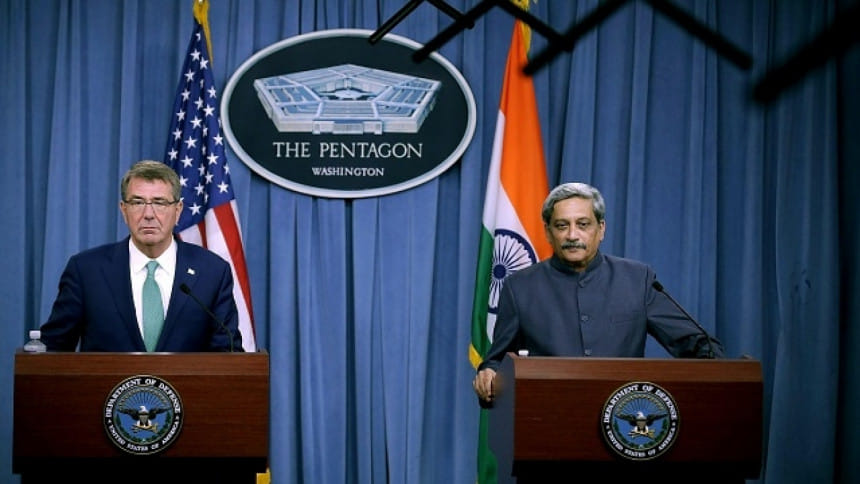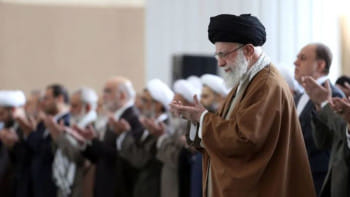Turning a new leaf in Indo-US relations

The Logistics Exchange Memorandum of Agreement (LEMOA) that was signed in Washington this week is considered a major shift in Indo-US relations. Negotiated for nearly twelve years this agreement is likely to enhance greater cooperation and boost India's defence preparedness, enhance the operational capacity of the Indian armed forces including their response to humanitarian crisis and disaster relief. The US has signed Logistic Support Agreement (LSA) with more than hundred countries in the world. However the agreement with India is unique as it gives the two countries the freedom to decide the extension of logistic service on a case to case basis given the sensitivity of India regarding a blanket permission that has been the case with US's agreement with other countries.
The negotiation for the LEMOA started in 2004. The long period of negotiation indicates the Indian cautiousness when it comes to extending logistics support to the US. India has been extremely guarded regarding its strategic autonomy and would not want to be seen as entering into any kind of partnership that will have strategic consequences for its penchant to follow an independent foreign policy. Successive governments have been careful about the strategic implications of such an agreement and its likely domestic political impact. Many have hailed this agreement as a logical progression in the upward movement in the Indo-US relations and argue that this agreement will Communications Interoperability and Security Memorandum of Agreement (CISMOA) and Basic Exchange and Cooperation Agreement for Geo-spatial Cooperation (BECA) are two other agreements that are yet to be concluded. However the signing of LEMOA in Washington and the visit of Secretary of State, John Kerry to participate in the second Strategic and Commercial Dialogue in New Delhi are equally significant for their strategic content and points to the emerging synergy in the bilateral relations. Indian External Affairs Minister in her inaugural remark in the Second Strategic and Commercial Dialogue emphasised that India's global role is of mutual interest to both and said "we look forward to continue working closely with the US to secure our membership of the Nuclear Suppliers Group and permanent membership of the UN Security Council". Therefore India is looking at the broader picture in terms of the global role that it aspires to play.
The Strategic Community in India is strongly wedded to the concept of strategic autonomy in India's foreign policy. However, signing of the LEMOA and various terms and condition enshrined in it only upholds India's emphasis on strategic autonomy. This means that India would retain its right to exercise its foreign policy independently without any alliance obligation. India was quite cagey about any partnership that will compel it to take a particular foreign policy stance which may go against India's national interest and undermine its role in the larger international context. This is one of the reasons why India, after independence, was extremely careful about the impact that the cold war may have on its strategic priorities and abhorred defence alliance and placed priorities on indigenisation of defence production to reduce dependency.
In the post-cold war period and especially after the Indo-US rapprochement following the 1998 nuclear tests, India's relations with the US underwent a subtle change as India struggled to get out of its cold war strategic inhibitions. There were convergences between the two countries on various issues, mainly terrorism. As the US decided to dehyphenate its relations with India and Pakistan, and treated the two countries separately based on US foreign policy interest; India attempted to slowly emerge out of the Cold War shadow. Its defence needs, quest for scientific and technological knowhow convinced India that it could partner US on the issues that are of interest to both countries. The Indo-US nuclear deal signed in 2005 cemented the relationship. Though some analysts in India argue that the countries do not share the same perspective on terrorism, the US is increasingly becoming sensitive to India's concerns. The fact that there is a trilateral dialogue between India, US and Afghanistan also reflects growing regional synergy on the issue. It is true that the strategic partnership is yet to achieve its full potential. Both the countries share similar concerns regarding the freedom of navigation, over-flight and uninterrupted commerce as part of a rule-based order in the Indo-Pacific. The two countries had the first Maritime Security Dialogue in May this year and have participated in the Malabar exercises, pointing to a broader convergence in the maritime strategy. The DTTI (Defence Technology and Trade Initiative) promises high end technology transfer to India including joint production enhancing the strategic value of US to India.
While the Congress termed the LEMOA as 'disastrous', the CPM termed it as 'anti-national and dangerous' for India's sovereignty and foreign policy and cautioned that India would lose the much preserved strategic autonomy. The Janata Dal (United) argued that the Agreement entails an alliance with the US and goes against the grain of India's independent foreign policy which now stands compromised. The argument of the political opposition in India is that the agreement allows the US uninhibited access to India's military bases without any corresponding advantage to India. However, analyses of LEMOA suggest that both India and US will have refuelling and resupply facilities, and this is confined to military logistics. It does not provide military bases or permanent hosting of troops and fighter jets for either party. The extension of these facilities would be decided on a case to case basis, and the two countries can deny these facilities if one of them feels that the base is used to wage war against a friendly country.
The Ministry of Defence of India has put to rest any speculation regarding the implications of LEMOA. In a statement, the ministry said any cooperative effort between the two as per the agreement will be decided on a case to case basis and the agreement does not create any obligation. The LEMOA, according to the agreement will be confined to "logistic Support, Supplies, and Services [which] include food, water, billeting, transportation, petroleum, oils, lubricants, clothing, communication services, medical services, storage services, training services, spare parts and components, repair and maintenance services, calibration services, and port services".
India, whose cumulative sea dependence is 93 percent, is wary of securing the sea lane of communication. Though the Indian Navy has expanded it's out of area operation over a period of time, the constraint of operating without refuelling and replenishment facilities would force India to ink strategic partnership with countries with whom its interests converge. In spite of apprehension and the jealousness with which India has protected its strategic autonomy; it is unlikely that the LEMOA will impinge on India's strategic choices, especially at a time when India is self-confident of its economic and strategic potential and is keen to play a global role. Moreover zero sum games are no more the fundamental rule in international politics post-cold war; the states are motivated by positive sum games that will provide win-win situations.
The writer is Research Fellow, IDSA.

 For all latest news, follow The Daily Star's Google News channel.
For all latest news, follow The Daily Star's Google News channel. 



Comments